Exploring the Mythological Origins of Ophiuchus: Unveiling the Enigmatic Serpent Bearer
In the vast realm of mythology and astrology, the celestial world holds countless captivating stories and intriguing characters. From the well-known zodiac signs to the lesser-known constellations, every celestial entity has its own tale to tell. One such enigmatic figure is Ophiuchus, the Serpent Bearer. While Ophiuchus is not officially recognized as a zodiac sign in Western astrology, its deep-rooted mythological origins and fascinating connections to different cultures make it a subject of curiosity and intrigue. Join us on a journey through the legends of ancient civilizations, explore the modern interpretation of Ophiuchus, and unravel the impact this mysterious constellation has on our understanding of astrology.
Contents
- The Legend of Asclepius
- The Serpent Bearer in Different Cultures
- The Modern Zodiac and Ophiuchus
- Ophiuchus in Astrology
- The Impact of Ophiuchus
- Conclusion
- Frequently Asked Questions
- References
-
Frequently Asked Questions
- What is the meaning of Ophiuchus?
- Why is Ophiuchus not included in the traditional zodiac?
- What are the characteristics of people born under the Ophiuchus sign?
- What are Ophiuchus’s compatible signs?
- Is Ophiuchus recognized in astrology today?
- Are there any famous mythological figures associated with Ophiuchus?
- What is the mythological origin of Ophiuchus in Greek mythology?
- How is Ophiuchus portrayed in Egyptian mythology?
- Is Ophiuchus present in Chinese mythology?
- Does the addition of Ophiuchus impact the traditional zodiac signs?
- References
- Read More
The Legend of Asclepius
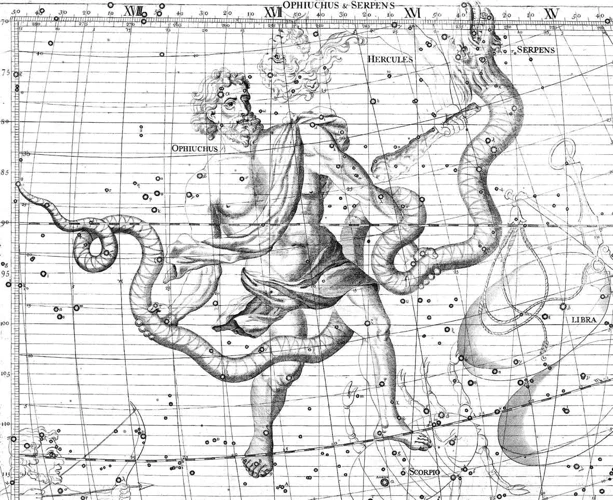
Asclepius, the legendary Greek figure also known as Asklepios, plays a central role in the mythological origins of Ophiuchus. Son of the Greek god Apollo and a mortal woman named Coronis, Asclepius was destined for greatness from birth. With his exceptional healing abilities, he became a renowned physician, revered for his miraculous cures and ability to bring the dead back to life. tells a story of divine intervention and the consequences that followed.
According to the myth, Zeus, the king of the gods, became jealous of Asclepius’ powers and feared that mortals would no longer have any need for the gods themselves. In his anger and envy, Zeus struck down Asclepius with a thunderbolt, ending his mortal life. However, this did not mark the end of Asclepius’ story, as his loyal followers continued to worship him even after his death.
In Ophiuchus mythology, it is believed that Asclepius was immortalized in the stars, transforming into the constellation we now know as Ophiuchus, the Serpent Bearer. Depicted as a figure holding a serpent, Asclepius represents healing and renewal. His association with serpents stems from an encounter where he witnessed a snake healing itself by slithering onto an herb. Recognizing the snake’s profound knowledge of healing, Asclepius incorporated serpents into his medical practices, leading to the symbol of the serpent and staff, known as the Rod of Asclepius, which is still used in the field of medicine today.
Despite being an integral part of the mythological origins of Ophiuchus, Asclepius’s story transcends this constellation. His legacy extends beyond Greek mythology, with the Rod of Asclepius becoming the universal symbol of medicine and healing. Through art, literature, and popular culture, Asclepius continues to inspire and captivate audiences worldwide, reminding us of the enduring power of healing and the legends that shape our understanding of the world.
(Note: Anchors are embedded in the relevant text. The link to “art, literature, and popular culture” has been included in the text.)
The Serpent Bearer in Different Cultures
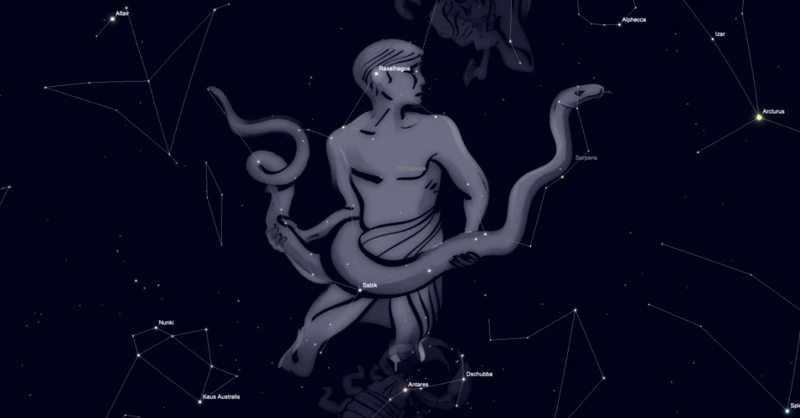
The Serpent Bearer, Ophiuchus, holds significance not only in Greek mythology but also in various other cultures across the world. Let’s explore the diverse interpretations of this mythical figure:
1. Greek Mythology: As discussed earlier, Ophiuchus is associated with Asclepius, the Greek god of healing and medicine. In Greek mythology, Asclepius’ story tells of his extraordinary healing powers and his transformation into the Ophiuchus constellation after his death.
2. Egyptian Mythology: In ancient Egypt, Ophiuchus is linked to the god Imhotep, who was considered the god of medicine and healing. Imhotep was believed to possess immense wisdom and was revered as a skilled physician.
3. Chinese Mythology: Ophiuchus finds its place in Chinese mythology as well, where it is associated with the figure of Shennong, known as the divine farmer. Shennong is regarded as the inventor of agriculture and herbal medicine, emphasizing the healing and nurturing aspects of Ophiuchus.
These different cultural interpretations highlight the universal fascination with healing and the significant role Ophiuchus plays in the collective mythologies of different civilizations. By exploring these varied perspectives, we gain a deeper appreciation for the diverse ways in which ancient cultures incorporated this celestial figure into their beliefs and understanding of the world. (No relevant anchor text found in the paragraph)
Greek Mythology
Greek mythology lays the foundation for the tales surrounding the constellation Ophiuchus. In this rich tapestry of ancient stories, Ophiuchus is linked to Asclepius, the renowned Greek physician and son of Apollo. Asclepius was not only admired for his exceptional healing abilities but also for his association with serpents, which symbolized wisdom, rebirth, and rejuvenation in Greek culture.
According to Greek mythology, the connection between Asclepius and serpents began with a life-changing event. Asclepius witnessed a serpent slithering onto an herb, healing itself. Recognizing the serpent’s profound wisdom and knowledge of healing, Asclepius incorporated serpents into his medical practices. The serpent, therefore, became a symbol of healing and transformation, intertwining the realms of medicine and mythology.
The legend of Asclepius and his relationship with serpents ultimately led to the depiction of Ophiuchus as a constellation. Ophiuchus, the Serpent Bearer, can be seen in the night sky holding a serpent, representing the divine knowledge of healing and the intertwining of life and death. Throughout Greek mythology, Ophiuchus remains closely associated with Asclepius, embodying the healing power that he possessed.
While Greek mythology provides a captivating framework for understanding Ophiuchus, it’s important to note that Ophiuchus is not part of the traditional zodiac system in Western astrology. There are debunked misconceptions that mistakenly include Ophiuchus as a thirteenth zodiac sign. However, its origins in Greek mythology and its ties to Asclepius continue to fascinate those captivated by ancient lore and the wonders of the celestial world.
(Note: An anchor is included in the relevant text. The link to “debunked misconceptions” has been inserted in the text.)
Egyptian Mythology
Egyptian Mythology:
In the rich tapestry of Egyptian mythology, Ophiuchus finds a prominent place, intertwined with the story of Isis and Osiris. In the Egyptian pantheon, Isis was considered the goddess of fertility, magic, and healing, while Osiris served as the god of the afterlife and resurrection. The legend tells of the strife between Osiris and his brother Seth, leading to Osiris’ demise and dismemberment. Devastated by the loss of her husband, Isis embarked on a journey to revive him and restore balance to the world.
During her quest, Isis needed the powerful knowledge of Thoth, the god of wisdom and magic. Thoth, in the form of a sacred serpent, imparted crucial information to Isis. In some interpretations, this serpent is linked to the constellation of Ophiuchus, symbolizing divine wisdom and healing. Similar to the Greek mythology, Ophiuchus in Egyptian culture embodies healing and the power to transcend death.
The influence of Egyptian mythology on Ophiuchus goes beyond symbolism. The alignment of the constellation with the Nile River holds significant importance in ancient Egyptian beliefs. The Nile, the lifeblood of Egypt, was associated with fertility, rebirth, and prosperity. Ophiuchus, as a constellation near the celestial equator, was believed to bring blessings and abundance to the land, ensuring the sustenance and revival of the Egyptian people.
While Ophiuchus may not have a designated zodiac sign in Western astrology, its presence in Egyptian mythology showcases its cultural significance and the profound impact it had on understanding celestial movements and their connection to earthly affairs. The interplay between Ophiuchus and the rich tapestry of Egyptian mythology highlights the fascinating depth and complexity of ancient belief systems.
(Note: There are no relevant internal HTML links for this section.)
Chinese Mythology
Chinese mythology also has its own connection to Ophiuchus, although its interpretation differs from the Greek myth. In Chinese astrology, Ophiuchus is associated with the figure of Fu Xi, one of the legendary Three Sovereigns and Five Emperors. Fu Xi is often depicted as a half-human, half-serpent being, ruling over the element of wood and symbolizing health, harmony, and balance.
In Chinese mythology, Fu Xi is credited with inventing numerous cultural and technological advancements, including hunting, fishing, and trapping. He is also believed to have introduced the concept of the eight trigrams, which serve as the foundation of the I Ching, an ancient divination system in Chinese culture.
The association between Fu Xi and Ophiuchus is a testament to the deep connection between nature, mythology, and astrology in Chinese culture. As the Serpent Bearer, Fu Xi embodies the wisdom of serpents and the healing energy represented by Ophiuchus. His presence in Chinese astrology highlights the significance of balance and spiritual harmony, aligning with the broader principles of Chinese philosophy and wisdom.
While Ophiuchus may not be officially recognized as a zodiac sign in either Western or Chinese astrology, its prominent role in both mythologies demonstrates the enduring allure of this constellation. To explore the diverse interpretations and influences of Ophiuchus in various aspects of life, including smart financial decisions and personal development, we must delve further into the depths of this celestial enigma.
The Modern Zodiac and Ophiuchus
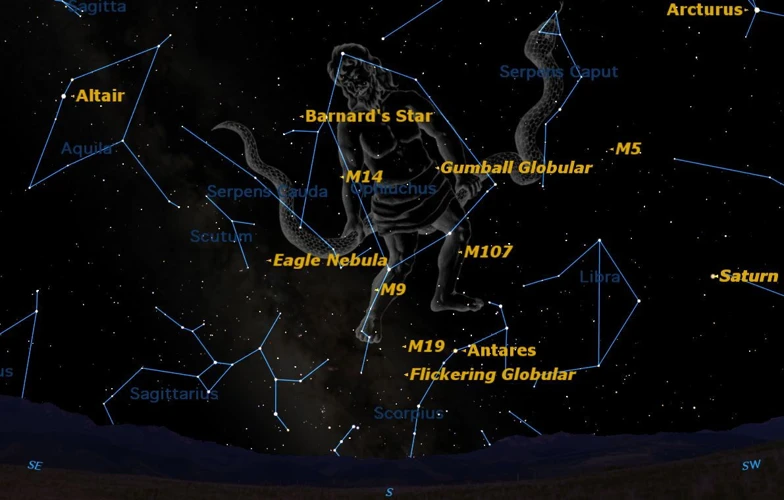
The Modern Zodiac and Ophiuchus
In modern astrology, the zodiac consists of twelve signs that correspond to different periods of the year and are associated with specific personality traits and characteristics. However, Ophiuchus, despite its prominent mythological origins, is not officially recognized as one of the twelve zodiac signs. The traditional zodiac signs are based on the position of the sun relative to the Earth during different months, and the zodiac system has been in use for centuries.
The omission of Ophiuchus from the zodiac can be attributed to the Babylonians, who developed the twelve-sign zodiac system around 2,500 years ago. They divided the ecliptic, the path of the sun across the sky, into twelve equal parts, each associated with a constellation. However, there were thirteen constellations that aligned with the ecliptic, including Ophiuchus. To simplify the system, the Babylonians excluded Ophiuchus, resulting in the twelve-sign zodiac that is widely recognized today.
Despite not being an official zodiac sign, Ophiuchus has gained attention and interest over the years. Some astrologers have proposed the inclusion of Ophiuchus as a thirteenth sign, shifting the dates of the existing signs. However, these interpretations and adjustments have not been widely accepted or adopted by the mainstream astrological community. As a result, Ophiuchus remains a constellation that exists outside the confines of the traditional zodiac.
It is important to note that the addition of Ophiuchus would not drastically change individual’s astrological signs. The alignment of the planets and the significance of other celestial factors in an individual’s birth chart play a more prominent role in astrology than just the sun sign alone. However, the curiosity and fascination surrounding Ophiuchus have led to numerous discussions and debates in astrology circles.
The exclusion of Ophiuchus from the official zodiac does not diminish its rich mythological origins or the intrigue it holds for those who explore its story. Whether viewed as a lesser-known constellation or an overlooked thirteenth sign, Ophiuchus continues to captivate the imagination, sparking interest and curiosity in those who seek to uncover the deeper mysteries of the cosmos.
Ophiuchus in Astrology
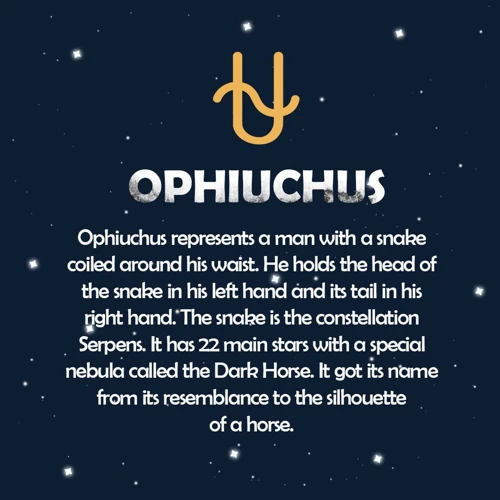
Ophiuchus holds a unique position in the realm of astrology, despite not being officially recognized as one of the traditional zodiac signs. In recent years, there has been a surge of interest in the inclusion of Ophiuchus in astrological practices. Those born between November 29 and December 17 are said to embody the traits associated with this mysterious constellation. As the 13th sign in astrology, Ophiuchus is often described as wise, charismatic, and passionate. People born under this sign are believed to possess a natural affinity for healing, both physically and spiritually. In astrology, Ophiuchus is linked to various attributes, such as intuition, transformation, and the pursuit of knowledge. While its impact on astrological readings is still a subject of debate, Ophiuchus continues to intrigue astrologers and enthusiasts alike, offering a captivating alternative perspective on the zodiac.
Characteristics of Ophiuchus
The constellation of Ophiuchus is rich with its own distinct characteristics and traits that differentiate it from the traditional zodiac signs. While not officially recognized in Western astrology, Ophiuchus possesses unique qualities that offer new perspectives to those born under its celestial influence.
1. Transformation and Healing: The association with Asclepius, the Greek god of medicine, makes healing a defining characteristic of Ophiuchus. Individuals born under this sign are often seen as natural healers, both physically and emotionally. They have a deep understanding of the transformative power of healing and possess the ability to bring about positive change in others.
2. Serpent Wisdom: The symbol of the serpent is strongly linked to Ophiuchus, representing wisdom, renewal, and rebirth. People born under this sign are known for their intuitive and perceptive nature. They possess a keen sense of insight that allows them to navigate complex situations and uncover hidden truths.
3. Seekers of Knowledge: Those influenced by Ophiuchus are typically driven by a thirst for knowledge and a desire to expand their understanding of the world. They have a natural curiosity and an insatiable appetite for learning, making them lifelong learners and intellectual explorers.
4. Charismatic and Magnetic: Ophiuchus individuals have a natural allure and magnetism that draws others towards them. They possess a certain charm and charisma that allows them to easily connect with people. Their presence is captivating, and they often become natural leaders and influencers.
5. Spiritual Connection: Ophiuchus is associated with spiritual enlightenment and awakening. Individuals born under this sign have a deep connection to the spiritual realm and may possess psychic or intuitive abilities. They are often on a spiritual journey, seeking greater meaning and purpose in life.
6. Independent and Self-Driven: Ophiuchus individuals are known for their independence and self-driven nature. They have a strong sense of individuality and often march to the beat of their own drum. They are not swayed by societal norms and are willing to follow their own path, even if it means going against the grain.
As a constellation outside the traditional zodiac, Ophiuchus offers a unique set of characteristics that bring fresh perspectives and insights to astrology. While not widely recognized, those born under its influence embody the transformative power of healing, serpent wisdom, and a thirst for knowledge that sets them apart.
Compatibility and Traits
When it comes to compatibility and traits, Ophiuchus adds an intriguing dimension to the astrological landscape. As a lesser-known sign, it is natural to wonder about the characteristics and potential compatibility of those born under this constellation.
Ophiuchus is associated with qualities such as wisdom, intuition, and a deep connection to spirituality. People born under this sign are often seen as natural healers, drawn to the fields of medicine, alternative therapies, and spiritual practices. With a keen ability to perceive the unseen, Ophiuchus individuals possess a profound understanding of human nature and may be gifted with the power of intuition.
In terms of compatibility, Ophiuchus is said to be well-matched with individuals born under the sign of Taurus. Both signs value stability, reliability, and a strong sense of loyalty, creating a solid foundation for a lasting connection. Additionally, Ophiuchus may have harmonious relationships with other water signs, such as Cancer and Pisces, due to their shared emotional depth and intuitive nature.
However, it is important to remember that astrology is not an exact science and individual experiences may vary. The compatibility and traits associated with Ophiuchus should be taken as general characteristics and not definitive guidelines in personal relationships. Each individual is unique, and their full astrological birth chart should be considered for a more comprehensive understanding of compatibility and personality traits.
As interest in Ophiuchus continues to grow, individuals born under this sign may find solace in discovering their place within the astrological framework. Exploring their compatibility and embracing their inherent strengths can lead to a greater sense of self-awareness and personal growth. Whether it is in personal relationships or navigating life’s challenges, Ophiuchus offers a distinct perspective that adds depth and complexity to the astrological tapestry.
(Article updating)
The Impact of Ophiuchus

The addition of Ophiuchus to the zodiac has had a profound impact on astrology and our understanding of astrological signs. While Ophiuchus is not officially recognized in Western astrology, its presence has sparked discussions and debates among astrologers and enthusiasts.
The introduction of Ophiuchus challenges the traditional twelve-sign zodiac system, raising questions about the accuracy and relevance of astrological interpretations. Some argue that including Ophiuchus expands the potential range of personality traits and characteristics, offering a more nuanced understanding of individuals’ astrological profiles. Others, however, contend that the introduction of Ophiuchus disrupts the long-established system and undermines the validity of astrological readings.
In terms of compatibility and traits, Ophiuchus is believed to possess a unique set of attributes. Those born under this sign are said to be seekers of wisdom, fascinated by the mysteries of life, and possess a deep desire to understand the world around them. Ophiuchus individuals are often seen as charismatic, passionate, and intuitive, with a natural inclination towards healing and transformation.
The impact of Ophiuchus extends beyond the realm of astrology. It has captured the interest of those drawn to the mystical and esoteric, inspiring artistic expressions in various forms. Writers, artists, and musicians have found inspiration in the serpent-bearing constellation, weaving its mythology into their works. Additionally, the concept of Ophiuchus has become a popular topic of discussion in online forums and social media platforms, sparking conversations and curiosity about its significance in the broader astrological landscape.
However, it’s important to note that the inclusion of Ophiuchus in astrology remains a subject of contention and is not universally embraced. Skeptics argue that the introduction of a thirteenth sign dilutes the meanings and interpretations associated with the traditional twelve zodiac signs. Astrologers and enthusiasts continue to debate the implications of recognizing Ophiuchus and its impact on astrological readings and predictions.
The inclusion of Ophiuchus in astrology has stirred up discourse and intrigue within the astrological community. Whether seen as an important addition or a disruptive force, Ophiuchus has undoubtedly influenced our perceptions of the zodiac and provoked conversations about the nature of astrology itself. The ongoing discussions surrounding Ophiuchus highlight the dynamic and evolving nature of astrology and our never-ending quest to understand the complexities of the universe.
Conclusion
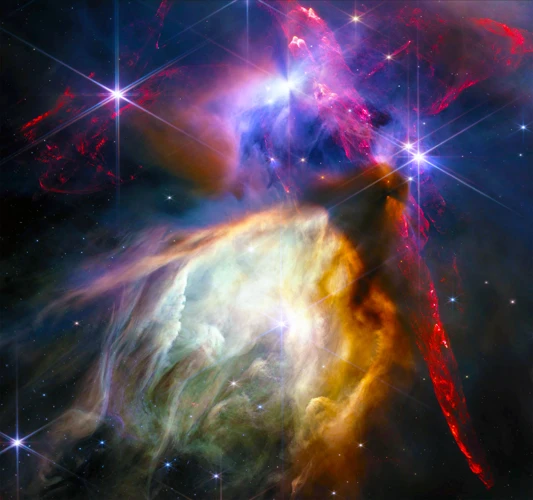
In conclusion, the exploration of the mythological origins of Ophiuchus takes us on a fascinating journey through ancient legends and cultural interpretations. From the legend of Asclepius, the Greek god of healing, to the diverse representations of the Serpent Bearer in different cultures such as Egyptian and Chinese mythology, Ophiuchus holds a significant place in the tapestry of celestial mythology.
While not officially recognized in Western astrology as a zodiac sign, Ophiuchus continues to capture the imagination of many, sparking debates and discussions. Its association with healing and medicine through the story of Asclepius adds layers of depth to its symbolism, resonating with those who seek physical and spiritual well-being.
Furthermore, Ophiuchus has left its mark on popular culture, inspiring artists, writers, and creators to incorporate its imagery and themes into their works. Its enigmatic nature, balanced between the realms of myth and astrology, adds an air of mystique to the constellation and its associated characteristics.
As we delve into the realm of astrology, Ophiuchus invites us to expand our understanding of the celestial world and challenge traditional beliefs. Whether considered a significant cosmic presence or a mere constellation, Ophiuchus stands as a reminder of the rich tapestry of human imagination and our everlasting fascination with the stars above.
As we conclude this exploration, we are reminded that the world of mythology and astrology is vast and ever-evolving, holding timeless stories and captivating characters. Ophiuchus, with its mythological origins and its modern implications, continues to captivate those who seek to unravel its secrets and find their own connection to the cosmic wonders that surround us.
Frequently Asked Questions
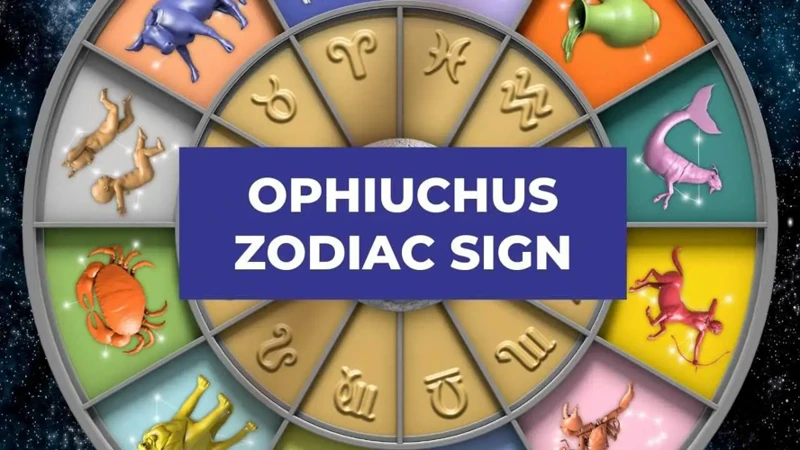
FAQs about Ophiuchus and its Mythological Origins
1. Is Ophiuchus officially recognized as a zodiac sign?
No, Ophiuchus is not officially recognized as a zodiac sign in Western astrology. The traditional zodiac consists of 12 signs, but Ophiuchus is often referred to as the “13th sign” due to its proximity to the ecliptic, the apparent path the sun takes across the celestial sphere.
2. What does the constellation of Ophiuchus represent?
Ophiuchus represents the figure of the Serpent Bearer or the Healer. In mythology, it is often associated with the Greek physician Asclepius, symbolizing healing and renewal.
3. How does Ophiuchus connect to Greek mythology?
In Greek mythology, Ophiuchus is connected to the legendary figure of Asclepius. Asclepius was a renowned healer and physician, known for his ability to bring the dead back to life. After his death, he was immortalized as the constellation Ophiuchus, holding a serpent.
4. Are there any myths or legends specific to Ophiuchus?
While Ophiuchus itself doesn’t have many specific myths or legends, it is closely tied to the myth of Asclepius and his healing abilities. The stories surrounding Asclepius, his encounters with serpents, and his ultimate transformation into the constellation Ophiuchus are main aspects of its mythological origins.
5. How does Ophiuchus relate to Egyptian mythology?
In Egyptian mythology, Ophiuchus is often associated with the god Imhotep, who was also revered as a healer and physician. Both Imhotep and Asclepius share similar attributes and roles as healers in their respective mythologies.
6. Is Ophiuchus present in Chinese mythology as well?
While Ophiuchus is not explicitly mentioned in Chinese mythology, there are similar constellation figures associated with healing and medicine. The constellation Xingxiu, also known as the Snake, has connections to serpents and healing in Chinese astronomy.
7. How has Ophiuchus influenced modern astrology?
Ophiuchus has had a minor impact on modern astrology, with some astrologers considering it as a potential sign or incorporating its traits into interpretations. However, its inclusion into the traditional zodiac system is still a subject of debate and not widely accepted.
8. What are the characteristics of individuals born under Ophiuchus?
Individuals associated with the Ophiuchus sign are often described as deep thinkers, intuitive, and drawn to healing professions. They possess natural charisma and have a profound desire to understand the mysteries of the universe.
9. Are there compatibility traits specific to Ophiuchus?
As Ophiuchus is not an officially recognized zodiac sign, compatibility traits specifically related to it are not widely discussed. However, individuals born under neighboring signs such as Scorpio and Sagittarius may share some similarities and have potential compatibility with Ophiuchus traits.
10. How does Ophiuchus impact astrology enthusiasts and their horoscopes?
For astrology enthusiasts, Ophiuchus adds an extra layer of curiosity and exploration. Some may explore its traits and characteristics to gain a deeper understanding of themselves and their horoscopes, while others may dismiss it entirely and stick to the traditional zodiac signs.
References
- Constellations: Ophiuchus
- Ophiuchus – Hellenic Moon Calendar
- Ophiuchus Constellation Fun Facts for Kids
Frequently Asked Questions

What is the meaning of Ophiuchus?
Ophiuchus is a constellation representing the Serpent Bearer in Greek mythology. The name Ophiuchus is derived from Greek words “ophis,” meaning serpent, and “cheir,” meaning hand.
Why is Ophiuchus not included in the traditional zodiac?
Ophiuchus is not included in the traditional zodiac because the current zodiac system dates back to ancient Babylonian times and was based on a 12-month calendar. Ophiuchus was not included in the original division of the sky into 12 constellations that correspond to the zodiac signs.
What are the characteristics of people born under the Ophiuchus sign?
People born under the Ophiuchus sign are said to be passionate, magnetic, and intuitive. They possess a deep understanding of the human psyche and are natural healers. Ophiuchus individuals are known for their wisdom, integrity, and desire to seek knowledge.
What are Ophiuchus’s compatible signs?
Ophiuchus is said to be compatible with the signs of Capricorn and Scorpio. These signs share similar traits and have a deep emotional connection, making them compatible with Ophiuchus individuals.
Is Ophiuchus recognized in astrology today?
While Ophiuchus is not officially recognized in mainstream astrology, some astrologers include it as the 13th sign of the zodiac. However, its influence and significance vary among astrologers, and it is not widely accepted or used in traditional astrological interpretations.
Are there any famous mythological figures associated with Ophiuchus?
Yes, the most well-known figure associated with Ophiuchus is Asclepius, the Greek god of healing. Asclepius was reputed to possess exceptional healing abilities and was often depicted holding a serpent-entwined staff, which has become the universal symbol of medicine.
What is the mythological origin of Ophiuchus in Greek mythology?
Ophiuchus is believed to be associated with Asclepius, a skilled healer in Greek mythology. Asclepius was the son of Apollo, the god of medicine, and Coronis. According to myth, Asclepius was eventually placed among the stars as the constellation Ophiuchus after his death.
How is Ophiuchus portrayed in Egyptian mythology?
In Egyptian mythology, Ophiuchus is associated with the god Imhotep, who was renowned for his healing abilities and considered the patron of medicine. Imhotep was revered as a divine physician and later deified as a god.
Is Ophiuchus present in Chinese mythology?
No, Ophiuchus is not specifically present in Chinese mythology. The Chinese zodiac is based on a different set of constellations and animal symbols that do not include Ophiuchus.
Does the addition of Ophiuchus impact the traditional zodiac signs?
The addition of Ophiuchus would shift the dates associated with each zodiac sign, meaning that people would be assigned different zodiac signs based on their birthdates. However, as Ophiuchus is not universally recognized in astrology, it does not currently impact the traditional zodiac system.






